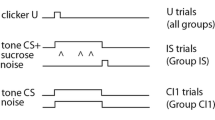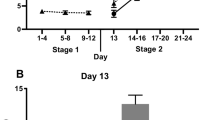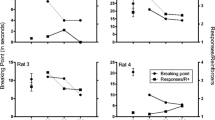Abstract
Consummatory contrast was investigated in food-deprived and nondeprived rats over repeated shifts from 32% to 4% sucrose. Repeated negative contrast was obtained across five downshifts, enduring in nondeprived subjects and tending to diminish in deprived subjects. Positive contrast was obtained with deprived subjects in the first upshift only but was not apparent with nondeprived subjects. In a second phase, deprivation conditions were reversed and subjects displayed patterns of negative contrast appropriate to the current deprivation condition, regardless of prior deprivation. Positive contrast was not obtained with formerly nondeprived subjects or when all subjects were on ad lib feeding, but reemerged when formerly deprived subjects were returned to a deprived state. The results are discussed in terms of the interaction of deprivation with the conflict mechanisms or the learned responses involved in contrast.
Similar content being viewed by others
References
BECKER, H. C. (1986). Comparison of the effects of the benzodiazepine midazolam and three serotonin antagonists on a consummatory conflict paradigm. Pharmacology, Biochemistry and Behavior, 24, 1057–1064.
BOWER, G. H. (1961). A contrast effect in differential conditioning. Journal of Experimental Psychology, 62, 196–199.
BRAZIER, M. M., & DACHOWSKI, L. (1991). Consummatory contrast effects in nondeprived rats following shifts in sucrose concentration. The Psychological Record, 41, 125–132.
CAPALDI, E. D. (1971). Simultaneous shifts in reward magnitude and level of food deprivation. Psychonomic Science, 23, 357–359.
CAPALDI, E. D., OWENS, J., & PALMER, K. A. (1994). Effects of food deprivation on learning and expression of flavor preferences conditioned by saccharin or sucrose. Animal Learning and Behavior, 22, 173–180.
FLAHERTY, C. F. (1982). Incentive contrast: A review of behavioral changes following shifts in reward. Animal Learning and Behavior, 10, 409–440.
FLAHERTY, C. F. (1991). Incentive contrast and selected animal models of anxiety. In L. Dachowski & C. F. Flaherty (Eds.), Current topics in animal learning: Brain, emotion, and cognition (pp. 207–243). New Jersey: Erlbaum.
FLAHERTY, C. F., BECKER, H. C., & CHECKE, S. (1983). Repeated successive contrast in consummatory behavior with repeated shifts in sucrose concentration. Animal Learning and Behavior, 11, 407–414.
FLAHERTY, C. F., BECKER, H. C., & DRISCOLL, C. (1982). Conditions under which amobarbital sodium influences contrast in consummatory behavior. Physiological Psychology, 10, 122–128.
FLAHERTY, C. F., BECKER, H. C., & POHORECKY, L. (1985). Correlation of corticosterone elevation and negative contrast varies as a function of postshift day. Animal Learning and Behavior, 13, 309–314.
FLAHERTY, C. F., GRIGSON, P. S., & LIND, S. (1990). Chlordiazepoxide and the moderation of the initial response to reward reduction. The Quarterly Journal of Experimental Psychology, 42B, 87–105.
FLAHERTY, C. F., & LARGEN, J. (1975). Within-subjects positive and negative contrast effects in rats. Journal of Comparative and Physiological Psychology, 88, 653–661.
FLAHERTY, C. F., LOMBARDI, B. R., WRIGHTSON, J., & DEPTULA, D. (1980). Conditions under which chlordiazepoxide influences successive gustatory contrast. Psychopharmacology, 67, 269–323.
FLAHERTY, C. F., & ROWAN, G. A. (1986). Successive, simultaneous, and anticipatory contrast in the consumption of saccharin solutions. Journal of Experimental Psychology: Animal Behavior Processes, 12, 381–393.
GRIGSON, P. S., & FLAHERTY, C. F. (1991). Cyproheptadine prevents the initial occurrence of successive negative contrast. Pharmacology Biochemistry and Behavior, 40, 433–442.
MEHIEL, R., & BOLLES, R. C. (1988). Learned flavor preferences based on calories are independent of initial hedonic value. Animal Learning and Behavior, 16, 383–387.
MELLGREN, R. L. (1972). Positive and negative contrast effects using delayed reinforcement. Learning and Motivation, 3, 185–193.
PREMACK, D., & HILLIX, W. A. (1962). Evidence for shift effects in the consummatory response. Journal of Experimental Psychology, 63, 284–288.
RABINER, D. L., KLING, J. W., & SPRAGUER, P. A. (1988). Modulation of taste- induced drinking: The effects of concentration shifts and drinking interruptions. Animal Learning and Behavior, 16, 365–376.
RILEY, E. P., & DUNLAP, W. P. (1979). Successive negative contrast as a function of deprivation condition following shifts in sucrose concentration. American Journal of Psychology, 92, 59–70.
SHANAB, M. E., & FERRELL, H. J. (1970). Positive contrast in the Lashley maze under different drive conditions. Psychonomic Science, 20, 31–32.
SHANAB, M. E., SANDERS, R., & PREMACK, D. (1969). Positive contrast in the runway obtained with delay of reward. Science, 164, 724–725.
Author information
Authors and Affiliations
Additional information
Portions of this study were conducted in partial fulfillment of the requirements for the degree of Doctor of Philosophy at Tulane University, New Orleans, Louisiana.
The author acknowledges the assistance of Lawrence W. Dachowski, Department of Psychology, Tulane University, in the supervision and direction of this project.
Rights and permissions
About this article
Cite this article
Brazier, M.M. Effects of Present and Former Deprivation on Consummatory Contrast. Psychol Rec 46, 187–200 (1996). https://doi.org/10.1007/BF03395171
Published:
Issue Date:
DOI: https://doi.org/10.1007/BF03395171




